- Home
- Gregory Maguire
Wicked: The Life and Times of the Wicked Witch of the West Page 40
Wicked: The Life and Times of the Wicked Witch of the West Read online
Page 40
“Chistery can do it.”
“Chistery can’t. He’s getting forgetful, and between him and Nanny they’d burn the place to the ground. No, there’s no more discussion about it, Liir; you’re not going. Besides, I’m going to have to travel on my broom, I think, to get there in time.”
“You never let me do anything.”
“You can do the washing up.”
“You know what I mean.”
“What’s he arguing about now, sweet thing?” asked Nanny loudly.
“Nothing,” said the Witch.
“What’s that you say?”
“Nothing.”
“Aren’t you going to tell her?” said Liir. “She helped raise Nessarose, didn’t she?”
“She’s too old, she doesn’t need to know. She’s eighty-five, it’ll only upset her.”
“Nanny,” said Liir, “Nessie’s dead.”
“Hush, you useless boy, before I remove your testicles with my foot.”
“Nessie did what?” screeched Nanny, looking rheumily out at them.
“Did died dead,” intoned Chistery.
“Did what?”
“Nessie DIED,” said Liir.
Nanny began to weep at the idea before she had even confirmed it. “Can this be true, Elphie? Is your sister dead?”
“Liir, you’ll answer for this,” said the Witch. “Yes, Nanny, I cannot lie to you. There was a storm and a building collapsed. She went very peacefully, they say.”
“She went straight to the bosom of Lurlina,” said Nanny, sobbing. “Lurlina’s golden chariot came to take her home.” She patted the piece of cheese on her plate, inexplicably. Then she buttered a napkin and took a bite. “When do we leave for the funeral?”
“You’re too old to travel, dear. I’m going in a few days. Liir will stay and look after you.”
“I will not,” said Liir.
“He’s a good boy,” said Nanny, “but not as good as Nessarose. Oh, sorrowful day! Liir, I’ll take my tea in my room, I can’t sit and talk to you as if nothing’s happened.” She hauled herself to her feet, leaning on Chistery’s head. (Chistery was devoted to her.) “You know, darling,” she said to the Witch, “I don’t think the boy is old enough to see to my needs. What if the castle is attacked again? Remember what happened the last time you went away.” She made a small, accusatory moue.
“Nanny, the Arjiki militia guard this place day and night. The Wizard’s army is well housed in the town of Red Windmill down below. They have no intention of leaving that safe haven and risking decimation in these mountain passes—not after what they did. That was their skirmish, that was their campaign. Now they’re just watchdogs. They staff the outpost to report signs of an invasion or trouble from the mountain clans. You know that. You have nothing to fear.”
“I’m too old to be taken in chains like poor Sarima and her family,” Nanny said. “And how could you rescue me, if you couldn’t get them back?”
“I’m still working on that,” said the Witch into Nanny’s left ear.
“Seven years. You’re very stubborn. It’s my opinion they’re all moldering in a common grave, these seven long years. Liir, you have to thank Lurlina that you weren’t among them.”
“I tried to rescue them,” said Liir stubbornly, who had rewritten the escapade in his own mind to give himself a more heroic role. It was not longing for the companionship of soldiers, he told himself, no, it was a courageous effort to save the family! In fact, Commander Cherrystone out of kindness had had Liir tied up and left him in a sack in someone’s barn, to prevent their having to incarcerate him with the others. The Commander had not realized Liir was a bastard son of Fiyero, for Liir himself didn’t know it.
“Yes well, that’s a good boy.” Nanny was now distracted from the sad news, drifting back to the tragedy she remembered more viscerally. “Of course I did everything I could, but Nanny was an old woman even then. Elphie, do you think they’re dead?”
“I could find out nothing,” said the Witch for the ten thousandth time. “If they were spirited to the Emerald City or if they were murdered, I could not tell. You know this, Nanny. I bribed people. I spied around. I hired agents to follow every lead. I wrote to the Princess Nastoya of the Scrow for advice. I spent a year following every useless clue. You know this. Don’t torture me with the memory of my failure.”
“It was my failure, I’m sure,” said Nanny peacefully; they all knew she didn’t think so for a minute. “I should have been younger and more vigorous. I’d have given that Commander Cherrystone a piece of my mind! And now Sarima is gone, gone, and her sisters too. I suppose it’s none of our fault, really,” she concluded disingenuously, scowling at the Witch. “You had someplace to go, so you went; who can criticize you for that?”
But the image of Sarima in chains, Sarima as a decaying corpse, still withholding from the Witch her forgiveness for Fiyero’s death—it pained her like water. “Give up, you old harridan,” said the Witch, “must my own household whip me so? Go have your tea, you fiend.”
The Witch sat down at last and thought of Nessarose, and what might come. The Witch had tried to stay removed from the affairs of the political world, but she knew a change of leadership in Munchkinland could throw things out of balance—maybe to a positive effect. She felt a guilty lightness at the death of her sister.
She made a list of things to bring with her to the memorial service. Foremost was a page of the Grimmerie. In her chamber she pored over the huge musty tome, and finally she ripped out an especially cryptic page. Its letters still continued to contort beneath her eyes, sometimes scrambling and unscrambling as she looked, as if they were formed by a colony of ants. Whenever she gazed at the book, meaning might emerge on a page that a day earlier had been illegible chicken scratches; and meaning sometimes disappeared as she stared. She would ask her father, who with his holy eyes would see the truth better.
3
Colwen Grounds was draped in black swags and purple bunting. When the Witch arrived, she was greeted by a one-man less-than-welcoming committee, a bearded Munchkinlander named Nipp, who seemed to be concierge, janitor, and acting Prime Minister. “Your lineage no longer allows you any particular liberties in Munchkinland,” she was told. “With the death of Nessarose, the honorific of Eminence is at last abolished.” The Witch didn’t much care, but she wasn’t inclined to accept a unilateral dictum without a retort. She answered, “It is abolished when I accept that it is abolished.” Not that the honorific had been used much in recent years; according to the occasional rambling letter from Frex, Nessarose had begun to be amused by the slur of “Wicked Witch of the East,” and had considered it a public penance worthy of a person with such high moral standing. She even took to referring to herself as such.
Nipp showed her to her room. “I don’t need much,” said the Wicked Witch of the West (as, in contrast, she allowed herself to be called, at least by these Munchkinlander upstarts). “A bed for a couple of days, and I’d like to see my father and attend the service. I’ll collect a few things, and be off soon. Now, do you know if our brother, Shell, will be here?”
“Shell has disappeared again,” said Nipp. “He left his regards. There is a mission he is undertaking in the Glikkus, it can’t wait. Some of us think he is defecting, worried about a change in government here now that the tyrant is dead. As well he might,” he added coldly. “Have you fresh towels?”
“I don’t use them,” said the Witch, “it’s all right. Go away now.” She was very tired, and sad.
At sixty-three, Frex was even balder, and his beard whiter, than he had been last time. His shoulders hunched in, as if trying to meet each other, his head sank into a natural cavity made by a deteriorating spine and neck. He sat covered by a blanket on the verandah. “And who is this,” he said when the Witch came up and sat next to him. She realized his sight had nearly gone for good.
“It’s your other daughter, Papa,” she said, “the one that’s left.”
“Fabala,�
�� he said, “what will I do without my pretty Nessarose? How will I live without my pet?”
She held his hand until he fell asleep, and wiped his face though his tears burned her skin.
The liberated Munchkinlanders were destroying the house. The Witch had no use for frippery, but it seemed a shame to waste a property this way. Desecration was so shortsighted; didn’t they know that, however they now decided to live, Colwen Grounds could be their parliament building?
She spent time with her father, but they didn’t speak much. One morning, when he was more alert and energetic than usual, he asked her if she really was a witch. “Oh well, what’s a witch? Who has ever trusted language in this family?” she replied. “Father, will you look at something for me? Will you tell me what you see?” She withdrew from an inner pocket the page from the Grimmerie and she unfolded it like a large napkin on his lap. He ran his hands over it, as if he could pick up meaning through his fingertips, and then held it near, peering and squinting.
“What do you see?” she asked. “Can you tell me the nature of this writing? Is it for good or for ill?”
“The markings are crisp enough, and large. I ought to be able to make it out.” He turned it upside down. “But little Fabala, I can’t read this alphabet. It is in a foreign tongue. Can you?”
“Well, sometimes I seem to be able to, but the talent is fleeting,” said the Witch. “I don’t know if it’s my eyes or if it’s the manuscript that’s being tricky.”
“You always had strong eyes,” said her father. “Even as a toddler you could see things no one else could.”
“Hah,” she said, “I don’t know what you mean.”
“You had a looking glass that sweet Turtle Heart made for you, and you looked in it as if you could see other worlds, other times.”
“I was probably looking at myself.”
But they both knew that wasn’t true, and Frex, for once, said so. “You didn’t look at yourself,” he said, “you hated to. You hated your skin, your sharp features, your strange eyes.”
“Where did I learn that hate?” she asked.
“You were born knowing it,” he said. “It was a curse. You were born to curse my life.” He patted her hand affectionately, as if he didn’t mean much by this. “When you lost your weird baby teeth, and your second teeth came in normally, we all relaxed a little. But for the first couple of years—until Nessarose was born—you were a little beast. Only when saintly Nessarose was delivered to us, even more scarred than you, did you settle down like a normal child.”
“Why was I cursed to be different?” she said. “You are a holy man, you must know.”
“You are my fault,” he said. Despite his words he was somehow pinning blame on her instead of himself, though she still wasn’t clever enough to see how this was done. “For what I had failed to do, you were born to plague me. But don’t worry yourself about it now,” he added, “that’s all long ago.”
“And Nessarose?” she asked. “How do the weights and balances of shame and guilt account for her?”
“She is a portrait of the lax morals of your mother,” Frex said calmly.
“And that’s why you could love her so much,” said the Witch. “Because her human frailty wasn’t your fault.”
“Don’t stew so, you always stewed,” Frex said. “And now she is dead, so what does it matter?”
“My life is still running on.”
“But mine is running out,” he answered, sadly. So she put his hand back on his lap, and kissed him gently, and folded up the page of the Grimmerie and tucked it in her pocket. Then she turned to greet the person approaching them across the lawn. She thought it was someone with tea (Frex was still accorded a measure of service, due to his age and his mildness, and, she supposed, his vocation), but she stood and pressed down the front of her homespun black skirt when she saw who it was.
“Miss Glinda of the Arduennas,” she said, her heart churring.
“Oh, you came, I knew you would,” said Glinda. “Miss Elphaba, the last true Eminent Thropp, no matter what they say!”
Glinda approached slowly, either through age or shyness, or because her ridiculous gown weighed so much that it was hard for her to get up enough steam to stride. She looked like a huge Glindaberry bush, was all the Witch could think; under that skirt there must be a bustle the size of the dome of Saint Florix. There were sequins and furbelows and a sort of History of Oz, it seemed, stitched in trapunto in six or seven ovoid panels all around the skirting. But her face: beneath the powdered skin, the wrinkles at eyelid and mouth, was the face of the timid schoolgirl from the Pertha Hills.
“You haven’t changed a whit,” said Glinda. “Is this your father?”
The Witch nodded but shushed her; Frex had dropped off again. “Come, we’ll walk in the gardens before they root up the roses out of some beknighted attempt at eradicating injustice.” The Witch took Glinda’s arm. “Glinda, you look hideous in that getup. I thought you’d have developed some sense by now.”
“When in the provinces,” she said, “you have to show them a little style. I don’t think it’s so bad. Or are the satin bells at the shoulder a bit too too?”
“Excessive,” agreed the Witch. “Someone get the scissors; this is a disaster.”
They laughed. “My dear, what they’ve done to this grand old place,” said Glinda. “Look, those pediments are meant to support graven urns, and those revolutionary slogans are painted all over that exquisite belvedere. I hope you’ll have something done, Elphie. There isn’t a belvedere to match that outside of the capital.”
“I never had the love of architecture that you did, Glinda,” said the Witch. “I just read the slogans: she walked all over us. Why shouldn’t they paint all over her belvedere? If she did in fact walk all over them?”
“Tyrants come and go, belvederes are forever,” said Glinda. “I can recommend topnotch restorers the moment you ask.”
“I hear you were one of the first on the scene,” said the Witch, “when Nessarose died. How did that come to be?”
“Sir Chuffrey—my hubby—he has some investments in pork futures, you know, and Munchkinland is trying to diversify its economic base so as not to be at the mercy of Gillikin banks and the Emerald City Corn Exchange. You never know what relationship might develop between Munchkinland and the rest of Oz, and it’s best to be prepared. So where Sir Chuffrey does business, I do good. It’s a partnership made in heaven. You know I have more money than I can give away?” She giggled and squeezed the Witch’s arm. “I never imagined that doing public charity would provide such a rush.”
“So you were here in Munchkinland—?”
“Yes, I had been at an orphanage on the shores of Mossmere, and for a lark I thought I’d go to the game park—they have dragons there now, and I’d never seen a dragon—so I was scarcely a dozen miles away when the storm hit. We had terrible winds even there; I cannot imagine how a ceremony could have been in progress in Center Munch. In Mossmere there were whole sections of the park closed to visitors due to the fear of falling trees and escaping Animals—”
“Oh, so they call it a game park, with Animals?” said the Witch.
“You must go, dear, it’s a lark. Well, as I was saying, the house came right out of the blue, and I suppose I mean that literally—if they’d sensed a big storm, they’d surely have canceled the event and run for cover. Anyway, the news system is very advanced now in parts of Munchkinland; Nessarose herself oversaw a system of beacons and tiktok code signals, to warn of invasions from the Wizard and points west. So it was only a matter of minutes before the news was being flashed in all directions. I commandeered a Mature Pfenix and asked her to bring me to Center Munch, and I arrived before most of the locals had quite figured out what had hit them.”
“Tell me about it,” said the Witch.
“You’ll be pleased to hear there was no blood. I venture to guess there were massive internal injuries, but there was no blood. Of course Nessarose’s last few devo
ted followers thought this meant her spirit was taken up intact, and that she suffered little. I don’t imagine she suffered much, not with that kind of clonk on the noggin. Her more unhappy subjects, who were the greater in number, thought it a droll act of Lurlina, releasing them from Nessarose’s particular sort of fundamentalist bondage. There was revelry when I arrived, and much feting of the funny girl and the dog who seem to have lived in the house.”
“Oh, who’s that?” said the Witch, who hadn’t heard this part.
“Well, you know how Munchkinlanders bow and scrape no matter what their democratic inclinations. No sooner had I arrived than they deferred to me, introducing me as a witch. I tried to correct them, a sorceress is really much more apt, but never mind. It was no doubt the outfit, it cowed them. I was in a salmon-pink fantasy that day, and really it suited me.”
“Go on,” said the Witch, who had never liked talking about clothes.
“Well, the child introduced herself: Dorothy from Kansas. I didn’t know the place, and said as much. She appeared as much surprised as anyone else about what had happened, and she had a nasty little pooch yapping about her heels. Tata or Toto or something. Toto. So this Dorothy was in some state of shock, I can tell you. A fairly homely little girl with little fashion sense, but I suppose that comes later in life for some than others.” She glanced sideways at the Witch. “Much later, in some cases.” And they both chuckled at that.
“Dorothy supposed she should try to get back to her home, but as she couldn’t remember having studied anything about Oz in school, nor could I recall a place named Kansas, we decided that she should look for help elsewhere. The fickle Munchkinlanders seemed ready to nominate her as Nessie’s successor, which would have angered Nipp and all those ministers in Colwen Grounds who’ve spent their careers jockeying for position when and if Nessarose ever saw fit to die. Besides, there may be other developments afoot. Dorothy might have gotten in the way.”
“An eye to public affairs, well, somehow I’m not surprised,” said the Witch, in fact quite pleased. “I always knew you were in there somewhere, Glinda.”

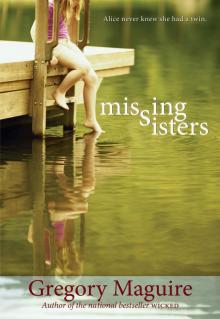 Missing Sisters
Missing Sisters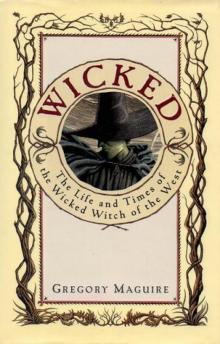 Wicked: The Life and Times of the Wicked Witch of the West
Wicked: The Life and Times of the Wicked Witch of the West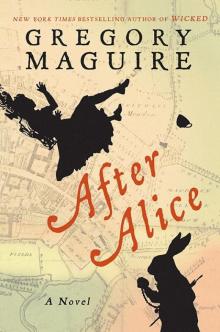 After Alice
After Alice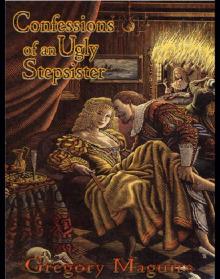 Confessions of an Ugly Stepsister
Confessions of an Ugly Stepsister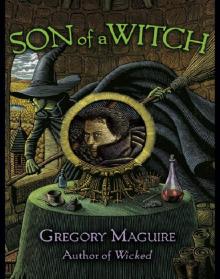 Son of a Witch
Son of a Witch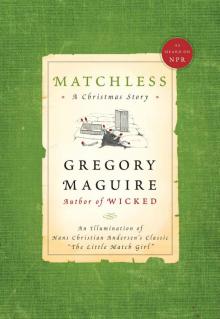 Matchless
Matchless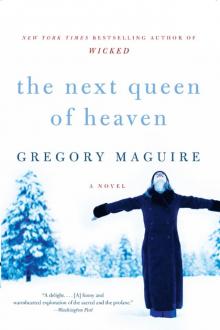 The Next Queen of Heaven
The Next Queen of Heaven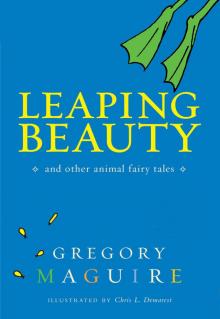 Leaping Beauty: And Other Animal Fairy Tales
Leaping Beauty: And Other Animal Fairy Tales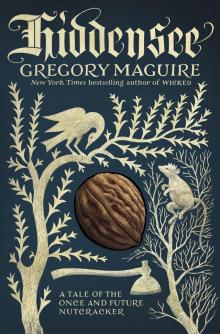 Hiddensee: A Tale of the Once and Future Nutcracker
Hiddensee: A Tale of the Once and Future Nutcracker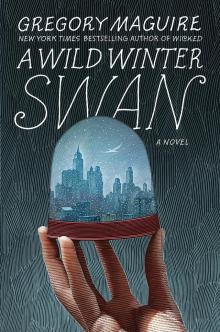 A Wild Winter Swan
A Wild Winter Swan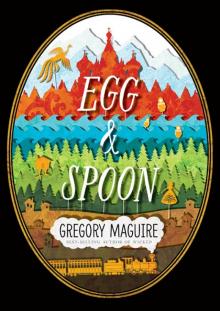 Egg & Spoon
Egg & Spoon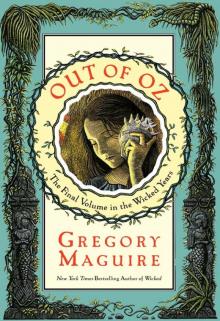 Out of Oz
Out of Oz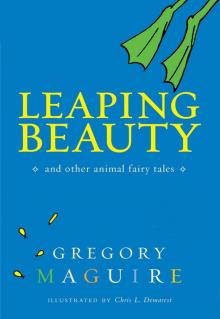 Leaping Beauty
Leaping Beauty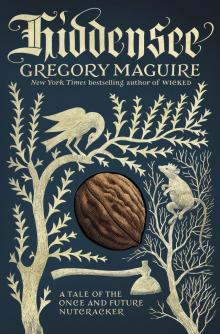 Hiddensee
Hiddensee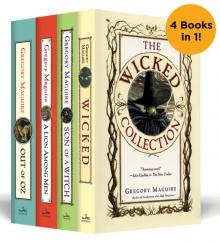 The Wicked Years Complete Collection
The Wicked Years Complete Collection The Next Queen of Heaven: A Novel
The Next Queen of Heaven: A Novel